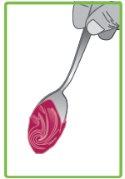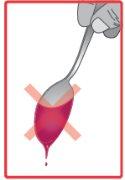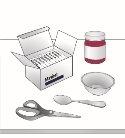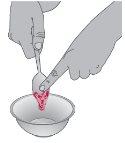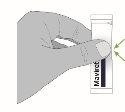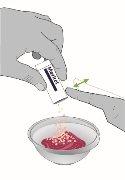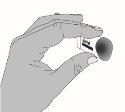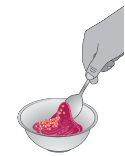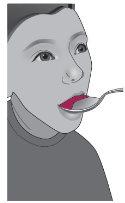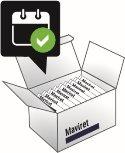
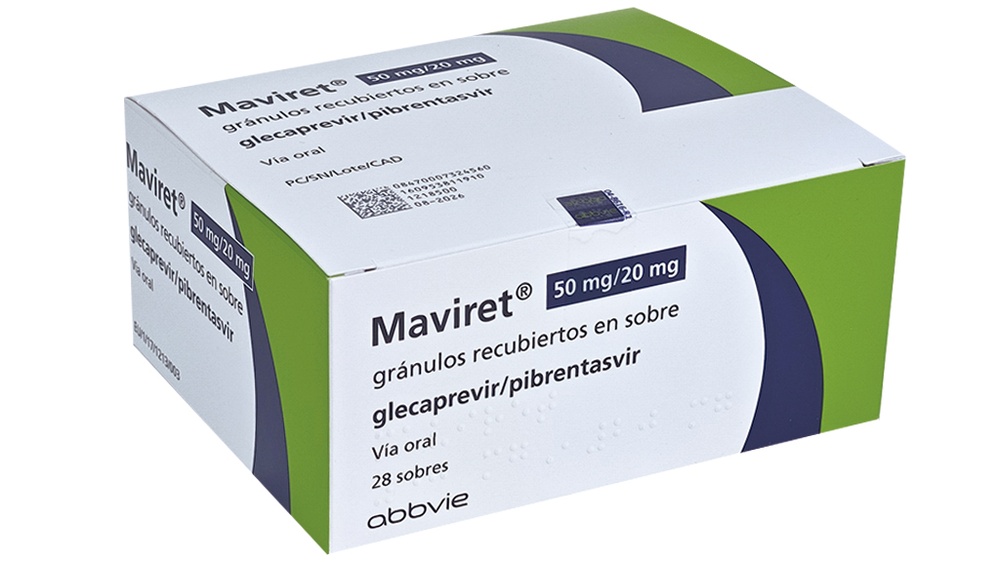
MAVIRET 50 mg/20 mg GRÂNULOS REVESTIDOS EM SACHE

Pergunte a um médico sobre a prescrição de MAVIRET 50 mg/20 mg GRÂNULOS REVESTIDOS EM SACHE

Como usar MAVIRET 50 mg/20 mg GRÂNULOS REVESTIDOS EM SACHE
Introdução
Prospecto: informação para o utilizador
Maviret 50mg/20mg granulados revestidos em saco
glecaprevir/pibrentasvir
Leia todo o prospecto atentamente antes de o seu filho começar a tomar este medicamento, porque contém informações importantes para o seu filho.
- Conserva este prospecto, porque pode ter que voltar a lê-lo.
- Se tiver alguma dúvida, consulte o médico do seu filho ou o farmacêutico.
- Este medicamento foi prescrito apenas para o seu filho. Não o deve dar a outras pessoas, mesmo que tenham os mesmos sintomas que o seu filho, porque pode prejudicá-las.
- Se o seu filho experimentar qualquer tipo de efeito adverso, consulte o médico ou farmacêutico. Isso inclui qualquer possível efeito adverso que não aparece neste prospecto. Ver seção 4.
Conteúdo do prospecto
- O que é Maviret e para que é utilizado
- O que precisa saber antes de o seu filho começar a tomar Maviret
- Como tomar Maviret
- Posíveis efeitos adversos
- Conservação de Maviret
- Conteúdo do envase e informação adicional
- Instruções de uso
1. O que é Maviret e para que é utilizado
Maviret é um medicamento antiviral utilizado para tratar crianças de 3 anos ou mais com hepatite C a longo prazo (“crónica”). Trata-se de uma doença infecciosa que afeta o fígado, causada pelo vírus da hepatite C. Maviret contém os princípios ativos glecaprevir e pibrentasvir.
Maviret atua impedindo que o vírus da hepatite C se multiplique e infecte novas células. Dessa forma, elimina a infecção do corpo.
2. O que precisa saber antes de o seu filho começar a tomar Maviret
Não dê Maviret se:
- se o seu filho for alérgico a glecaprevir, pibrentasvir ou a algum dos outros componentes deste medicamento (incluídos na seção 6).
- se o seu filho sofrer de problemas hepáticos graves além da hepatite C.
- se o seu filho estiver tomando os seguintes medicamentos:
- atazanavir (para a infecção por HIV)
- atorvastatina ou simvastatina (para reduzir o colesterol no sangue)
- carbamazepina, fenobarbital, fenitoína, primidona (normalmente utilizados para a epilepsia)
- dabigatrán etexilato (para prevenir coágulos de sangue)
- medicamentos que contêm etinilestradiol (como os medicamentos anticoncepcionais, que incluem anéis vaginais, adesivos transdérmicos e comprimidos)
- rifampicina (para as infecções)
- erva-de-São-João (hypericum perforatum), (medicamento à base de plantas que se usa para a depressão leve).
Não dê Maviret ao seu filho se se encontrar em alguma das situações acima. Em caso de dúvida, consulte o médico do seu filho ou o farmacêutico antes de administrar Maviret.
Advertências e precauções
Consulte o médico do seu filho se se encontrar em algum dos seguintes casos, porque o médico poderá querer supervisionar o seu filho mais de perto:
- sofre de problemas de fígado distintos da hepatite C
- sofreu ou sofre de uma infecção por vírus da hepatite B
- sofre de diabetes. Após começar com Maviret, pode ser que o seu filho precise de um controle rigoroso da concentração de glicose no sangue e/ou ajustar o tratamento antidiabético. Após começar o tratamento com medicamentos como Maviret, alguns pacientes diabéticos apresentaram um nível de açúcar baixo no sangue (hipoglicemia).
Análise de sangue
O médico do seu filho fará análises de sangue antes, durante e após o tratamento com Maviret. Dessa forma, o médico poderá determinar o seguinte:
- se o seu filho deve tomar Maviret e por quanto tempo
- se o tratamento funcionou e o seu filho já não apresenta o vírus da hepatite C.
Crianças menores de 3 anos
Este medicamento não deve ser administrado a crianças menores de 3 anos ou que pesem menos de 12 kg. Não foi estudado ainda o uso de Maviret em crianças menores de 3 anos ou que pesem menos de 12 kg.
Outros medicamentos e Maviret
Informe o médico do seu filho ou o farmacêutico se estiver tomando, tomou recentemente ou possa ter que tomar qualquer outro medicamento.
Informe o médico do seu filho ou o farmacêuticoantes de administrar Maviret, se o seu filho estiver tomando algum dos medicamentos da seguinte tabela. É possível que o médico tenha que mudar a dose desses medicamentos.
Medicamentos que deve notificar ao médico do seu filho antes de administrar Maviret | |
Medicamento | Finalidade do medicamento |
ciclosporina, tacrolimus | para reduzir a atividade do sistema imunológico |
darunavir, efavirenz, lopinavir, ritonavir | para a infecção por HIV |
digoxina | para os problemas do coração |
fluvastatina, lovastatina, pitavastatina, pravastatina, rosuvastatina | para reduzir o colesterol no sangue |
warfarina e outros medicamentos semelhantes* | para prevenir coágulos de sangue |
*É possível que o médico do seu filho aumente a frequência dos exames de sangue para verificar o correto funcionamento do processo de coagulação do sangue do seu filho.
Se o seu filho se encontrar em alguma das circunstâncias acima (ou não estiver seguro), consulte o médico do seu filho ou o farmacêutico antes de administrar Maviret.
Maviret contém lactose
Se o seu médico indicou que o seu filho padece de intolerância a certos açúcares, consulte com ele antes de administrar este medicamento.
Maviret contém propilenglicol
Este medicamento contém 4 mg de propilenglicol em cada saco.
Maviret contém sódio
Este medicamento contém menos de 1 mmol de sódio (23 mg) por saco; isso é “isento de sódio”.
3. Como tomar Maviret
Siga sempre exatamente as instruções de administração deste medicamento indicadas pelo médico do seu filho ou pelo farmacêutico. Em caso de dúvida, consulte o médico do seu filho ou o farmacêutico. Maviret granulados revestidos está indicado para crianças de 3 a menos de 12 anos de idade e que pesem de 12 kg a menos de 45 kg. Maviret comprimidos estão indicados para adultos, crianças de 12 anos ou mais ou crianças que pesem 45 kg ou mais.
O médico do seu filho indicará por quanto tempo o seu filho precisará tomar Maviret.
Quantidade que deve tomar
A dose recomendada para crianças de 3 a menos de 12 anos de idade baseia-se no peso corporal, como se indica na tabela que segue.
Peso da criança (kg) | Número de sacos uma vez ao dia |
De 12 a menos de 20 kg | 3 sacos |
De 20 a menos de 30 kg | 4 sacos |
De 30 a menos de 45 kg | 5 sacos |
No caso de crianças que pesem 45 kg ou mais, consulte o médico do seu filho sobre a possibilidade de administrar Maviret em comprimidos.
Como tomar Maviret
- Administre Maviret uma vez ao dia logo antes ou após tomar um lanche ou refeição principal.
- Misture todos os granulados do saco com uma pequena quantidade de alimentos recomendados e engula. Os granulados não devem ser triturados nem mastigados (ver as instruções de uso para consultar a lista de alimentos recomendados).
- Não administre Maviret granulados através de uma sonda de alimentação.
Se o seu filho vomitar após tomar Maviret, a quantidade deste medicamento presente no sangue pode ser afetada. Nesse caso, a eficácia de Maviret pode ser menor.
- Se vomitar quando passaram menos de 3horasapós ter tomado Maviret, administre outra dose.
- Se vomitar quando passaram mais de 3horasapós ter tomado Maviret, não é necessário que administre outra dose até que chegue a próxima dose programada.
Se tomar mais Maviret do que deve
Se acidentalmente tomar uma quantidade superior à dose recomendada, consulte o médico do seu filho ou vá imediatamente ao hospital mais próximo. Leve consigo o envase deste medicamento para poder mostrar ao médico o que o seu filho tomou.
Se esquecer de administrar Maviret
É importante não saltar as doses deste medicamento.
Se o seu filho não tomar uma dose, calcule quanto tempo faz que deveria ter tomado Maviret:
- Se se lembrar em menos de 18horasapós a hora em que o seu filho habitualmente toma a dose de Maviret, administre-a o mais rápido possível. Em seguida, administre a próxima dose no horário de sempre.
- Se se lembrar em 18horas ou maisapós a hora em que o seu filho habitualmente toma a dose de Maviret, espere e administre a próxima dose no horário de sempre. Não administre uma dose dupla (duas doses muito seguidas).
Se tiver alguma outra dúvida sobre o uso deste medicamento, pergunte ao médico do seu filho ou ao farmacêutico.
4. Posíveis efeitos adversos
Assim como todos os medicamentos, este medicamento pode produzir efeitos adversos, embora nem todas as pessoas os sofram.
Informe o médico do seu filho ou o farmacêutico se notar algum dos seguintes efeitos adversos:
Muito frequentes:podem afetar mais de 1 de cada 10 pessoas
- sensação de muito cansaço (fadiga)
- dor de cabeça
Frequentes:podem afetar até 1 de cada 10 pessoas
- ganas de vomitar (náuseas)
- diarreia
- sensação de fraqueza ou falta de energia (astenia)
- aumento em um exame de laboratório da função hepática (bilirrubina)
Pouco frequentes:podem afetar até 1 de cada 100 pessoas
- inchaço do rosto, lábios, língua, garganta, abdômen, braços ou pernas
Frequência não conhecida:não pode ser estimada a frequência a partir dos dados disponíveis
- coceira
Comunicação de efeitos adversos
Se o seu filho experimentar qualquer tipo de efeito adverso, consulte o médico do seu filho ou o farmacêutico. Isso inclui qualquer possível efeito adverso que não aparece neste prospecto. Também pode comunicá-los diretamente através do sistema nacional de notificação incluído no Apêndice V. Mediante a comunicação de efeitos adversos, você pode contribuir para fornecer mais informações sobre a segurança deste medicamento.
5. Conservação de Maviret
Mantenha este medicamento fora da vista e do alcance das crianças.
Não utilize este medicamento após a data de validade que aparece na caixa e no saco após “CAD”. A data de validade é o último dia do mês que se indica.
Este medicamento não requer condições especiais de conservação.
Os medicamentos não devem ser jogados nos esgotos nem na lixeira. Pergunte ao seu farmacêutico como se livrar dos envases e dos medicamentos que não precisa. Dessa forma, ajudará a proteger o meio ambiente.
6. Conteúdo do envase e informação adicional
Composição de Maviret
- Os princípios ativos são glecaprevir e pibrentasvir. Cada sobre contém 50 mg de glecaprevir e 20 mg de pibrentasvir.
- Os demais excipientes são:
- Copovidona, tocofersolano, propilenglicol monocaprilato, dióxido de silício coloidal, croscarmelosa sódica (apenas nos grânulos de glecaprevir), estearil fumarato de sódio, hipromelosa (E464), lactosa monohidrato, dióxido de titânio, macrogol, óxido de ferro vermelho (E172), óxido de ferro amarelo (E172)
Maviret contém lactosa, propilenglicol e sódio. Ver seção 2.
Aspecto de Maviret e conteúdo do envase
Os grânulos revestidos de Maviret são fornecidos dentro de sobres com película de poliéster/alumínio/poliétileno que vêm em caixas. Cada caixa contém 28 sobres. Cada sobre contém grânulos rosas e amarelos.
Título da autorização de comercialização
AbbVie Deutschland GmbH & Co. KG
Knollstrasse
67061 Ludwigshafen
Alemanha
Fabricante
AbbVie S.r.l.
S.R. 148 Pontina km 52 SNC
04011 Campoverde di Aprilia (LT)
Itália
Pode solicitar mais informações sobre este medicamento dirigindo-se ao representante local do titular da autorização de comercialização:
Bélgica AbbVie SA Tel: +32 10 477811 | Lituânia AbbVie UAB Tel: +370 5 205 3023 |
Bulgária AbbVie Tel: +359 2 90 30 430 | Luxemburgo AbbVie SA Bélgica Tel: +32 10 477811 |
República Tcheca AbbVie s.r.o. Tel: +420 233 098 111 | Hungria AbbVie Kft. Tel: +36 1 455 8600 |
Dinamarca AbbVie A/S Tlf: +45 72 30-20-28 | Malta V.J.Salomone Pharma Limited Tel: +356 22983201 |
Alemanha AbbVie Deutschland GmbH & Co. KG Tel: 00800 222843 33 (gratuito) Tel: +49 (0) 611 / 1720-0 | Países Baixos AbbVie B.V. Tel: +31 (0)88 322 2843 |
Estônia AbbVie OÜ Tel: +372 623 1011 | Noruega AbbVie AS Tlf: +47 67 81 80 00 |
Grécia AbbVie ΦΑΡΜΑΚΕΥΤΙΚΗ Α.Ε. Tel: +30 214 4165 555 | Áustria AbbVie GmbH Tel: +43 1 20589-0 |
Espanha AbbVie Spain, S.L.U. Tel: +34 91 384 09 10 | Polônia AbbVie Polska Sp. z o.o. Tel: +48 22 372 78 00 |
França AbbVie Tel: +33 (0)1 45 60 13 00 | Portugal AbbVie, Lda. Tel: +351 (0)21 1908400 |
Croácia AbbVie d.o.o. Tel: +385 (0)1 5625 501 | Romênia AbbVie S.R.L. Tel: +40 21 529 30 35 |
Irlanda AbbVie Limited Tel: +353 (0)1 4287900 | Eslovênia AbbVie Biofarmacevtska družba d.o.o. Tel: +386 (1)32 08 060 |
Islândia Vistor hf. Sími: +354 535 7000 | República Eslovaca AbbVie s.r.o. Tel: +421 2 5050 0777 |
Itália AbbVie S.r.l. Tel: +39 06 928921 | Finlândia AbbVie Oy Puh/Tel: +358 (0)10 2411 200 |
Chipre Lifepharma (Z.A.M.) Ltd Tel: +357 22 34 74 40 | Suécia AbbVie AB Tel: +46 (0)8 684 44 600 |
Letônia AbbVie SIA Tel: +371 67605000 | Reino Unido (Irlanda do Norte) AbbVie Deutschland GmbH & Co. KG Tel: +44 (0)1628 561090 |
Data da última revisão deste prospecto 05/2022
Outras fontes de informação
A informação detalhada deste medicamento está disponível no site da Agência Europeia de Medicamentos: http://www.ema.europa.eu.
Para solicitar uma cópia deste prospecto em tamanho de letra grande, entre em contato com o representante local do titular da autorização de comercialização.
- Instruções de uso
Leia toda a seção 7 antes de usar os grânulos em sobres de Maviret.
Passo 1. Pegue o número de sobres que o médico de seu filho tenha recomendado | ||||||||||
No caso de crianças que pesem 45 kg ou mais, consulte o médico de seu filho sobre a possibilidade de administrar Maviret em comprimidos. Não administre mais de 5 sobres. | ||||||||||
Passo 2. Escolha um alimento adequado para misturar com os grânulos de Maviret | ||||||||||
| Se o alimento for adequado, deverá poder ser pegado com a colher sem cair. Deve ser macio, com baixo teor de água e que possa ser engolido sem necessidade de mastigar. Exemplos de alimentos recomendados:
Nota: além do alimento que se usa para misturar com os grânulos, deverá tomar Maviret ao mesmo tempo ou logo após uma refeição principal ou um lanche. O alimento que se usa para misturar com os grânulos não substitui a refeição principal ou lanche que deve ser tomado com Maviret. | |||||||||
| Nãouse alimentos que gotejem da colher, pois o medicamento poderia dissolver-se rapidamente, ter um sabor amargo e ser menos eficaz. Nãouse alimentos aos quais seu filho seja alérgico. Exemplos de alimentos que nãodeve usar: ? Líquidos ou alimentos aquosos ? Molho de maçã ? Alimentos ou líquidos que tenham sido aquecidos ou estejam congelados ? Pão ou outro alimento que requeira mastigar ? Iogurte que não seja grego ? Comida para bebês ? Alimentos que gotejem da colher Para solicitar mais informações sobre os alimentos que são adequados, consulte o médico de seu filho ou o farmacêutico. | |||||||||
| Passo 3. Prepare os materiais necessários Sobre uma superfície limpa, coloque o seguinte:
| |||||||||
| Passo 4. Meça a quantidade de alimento
| |||||||||
| Passo 5. Prepare o sobre
| |||||||||
| Passo 6. Corte a parte superior do sobre
Tenha cuidado: Os grânulos são muito pequenos e podem cair fora facilmente. | |||||||||
| Passo 7. Esvazie o sobre
| |||||||||
| Passo 8. Verifique o sobre Olhe dentro de cada sobre para garantir que não haja grânulos dentro. Nãodeixe grânulos dentro do sobre, pois a eficácia do medicamento poderia ser menor se não for tomada a dose completa. | |||||||||
| Passo 9. Misture
Se não for administrada dentro de 5 minutos, a mistura pode ter um sabor amargo. Se não for administrada dentro de 15 minutos, pode ser que o medicamento seja menos eficaz. Descarte-a e comece novamente. | |||||||||
| Passo 10. Administre o medicamento
? Se seu filho não tomar uma dose, consulte a seção 3 “Como tomar Maviret” para obter mais informações. | |||||||||
| Passo 11. Confirme a dose para o dia seguinte Verifique se há sobres suficientes para a próxima dose de Maviret de seu filho. Para repor os sobres ou renovar a prescrição, entre em contato com o médico de seu filho ou o farmacêutico. |
- País de registo
- Substância ativa
- Requer receita médicaSim
- Fabricante
- Esta informação é apenas para referência e não constitui aconselhamento médico. Consulte sempre um médico antes de tomar qualquer medicamento. A Oladoctor não se responsabiliza por decisões médicas baseadas neste conteúdo.
- Alternativas a MAVIRET 50 mg/20 mg GRÂNULOS REVESTIDOS EM SACHEForma farmacêutica: COMPRIMIDO, 100/40 mgSubstância ativa: glecaprevir and pibrentasvirFabricante: Abbvie Deutschland Gmbh & Co. KgRequer receita médicaForma farmacêutica: SOLUÇÃO/SUSPENSÃO ORAL, 150 MG/ 37,5 MGSubstância ativa: sofosbuvir and velpatasvirFabricante: Gilead Sciences Ireland Unlimited CompanyRequer receita médicaForma farmacêutica: SOLUÇÃO/SUSPENSÃO ORAL, 200 MG/50 MGSubstância ativa: sofosbuvir and velpatasvirFabricante: Gilead Sciences Ireland Unlimited CompanyRequer receita médica
Alternativas a MAVIRET 50 mg/20 mg GRÂNULOS REVESTIDOS EM SACHE noutros países
As melhores alternativas com o mesmo princípio ativo e efeito terapêutico.
Alternativa a MAVIRET 50 mg/20 mg GRÂNULOS REVESTIDOS EM SACHE em Ukraine
Médicos online para MAVIRET 50 mg/20 mg GRÂNULOS REVESTIDOS EM SACHE
Avaliação de posologia, efeitos secundários, interações, contraindicações e renovação da receita de MAVIRET 50 mg/20 mg GRÂNULOS REVESTIDOS EM SACHE – sujeita a avaliação médica e regras locais.




